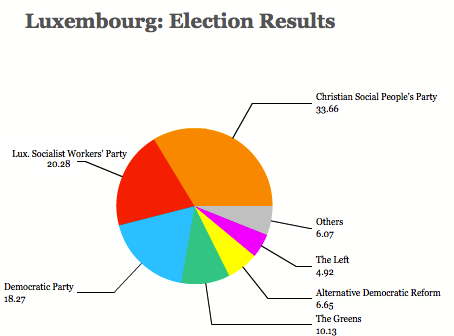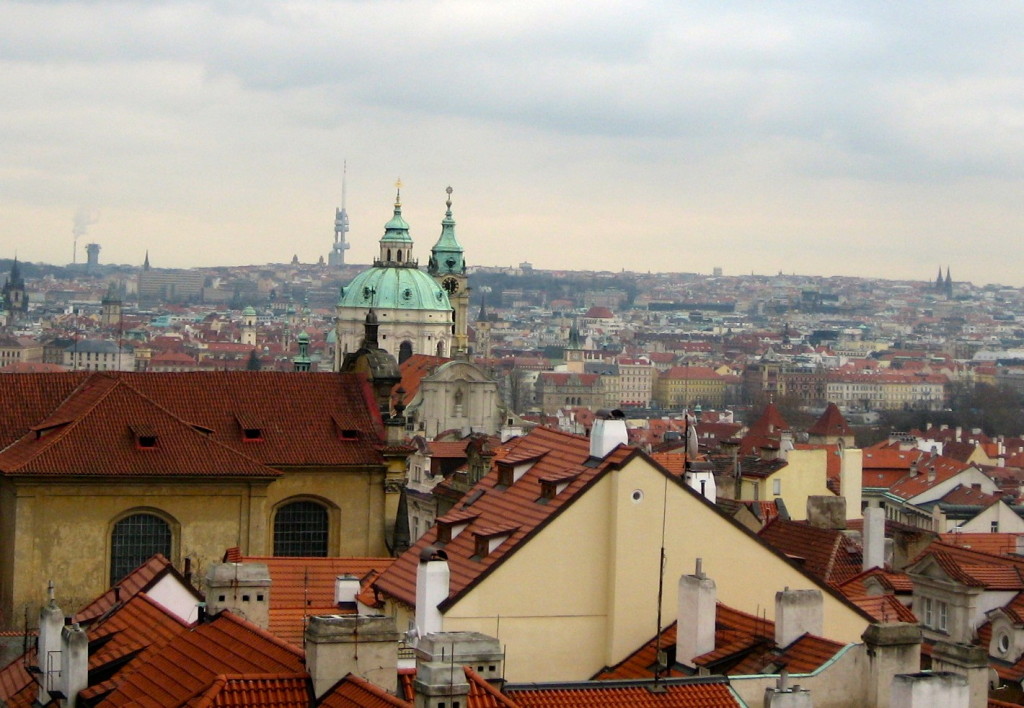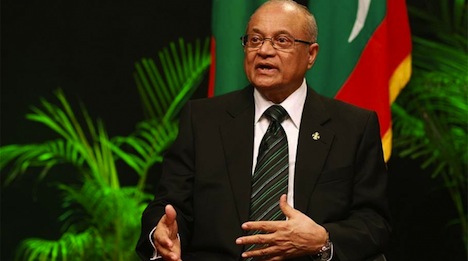
As expected, the party of Europe’s longest-serving prime minister Jean-Claude Juncker won Luxembourg’s parliamentary elections over the weekend.
Despite having lost nearly 5% from the result of the previous 2009 elections, Juncker’s center-right Chrëschtlech Sozial Vollekspartei (CSV, Christian Social People’s Party) still finished with more support than any other party, entitling it to 23 seats in Luxembourg’s 60-member unicameral parliament, the D’Chamber (Chamber of Deputies), a loss of three seats:
“I am satisfied with the results as far as my party remains the number one party in Luxembourg, with a huge distance between my party and the two other main political parties,” Mr Juncker said.
“We should be entitled to form the next government.” But he said it was too early to begin coalition talks.
Its coalition partner between 2004 and 2013, the center-left Lëtzebuerger Sozialistesch Arbechterpartei (LSAP, Luxembourg Socialist Workers’ Party), finished in second place, winning the same number as seats as it had previously (13), despite the fact that its support declined, especially in its stronghold in the south of the country.
But the third-place liberal Demokratesch Partei (DP, Democratic Party) also won 13 seats, a four-seat gain that makes it the clear winner, in terms of momentum, in Sunday’s election.
While the Democrats may have hoped for even more seats, the party made the starkest gains in Sunday’s election and that its leader, Luxembourg City mayor Xavier Bettel, is a rising star in Luxembourgish politics. Though Bettel may not have won enough seats to make a play to become prime minister, he’s young enough (40) that he now stands a strong chance of making further gains in the next set of Luxembourgish elections.
Moreover, while Juncker may well return into a governing coalition with the LSAP, it was the LSAP’s refusal to back Juncker in a key vote over the summer over a scandal involving illegal domestic surveillance within Luxembourg’s secret service, which led to Juncker’s resignation and Luxembourg’s first snap elections in decades. Though Juncker wasn’t directly involved in the scandal, a parliamentary inquiry found that he shared political responsibility for failing to adequately oversee the secret service and intelligence agency. Despite the scandal, however, it wasn’t expected that the CSV would forfeit its dominance within Luxembourgish politics, though polls predicted slight losses for Juncker and his coalition partner, the LSAP.
Juncker has served as prime minister since 1995 and, between 1989 and 2009, also served as Luxembourg’s finance minister.
Given that the Democrats were the clear winners in Sunday’s vote, there’s a chance that Juncker could turn to the Democrats to join his government (as Juncker did between 1999 and 2004), putting Bettel even more clearly on the path as Juncker’s heir apparent.
LSAP leader Etienne Schneider hinted as much after Sunday’s votes were counted:
Schneider commented that another LSAP and CSV coalition would not necessarily be the most democratic, since it would exclude the party with the biggest gain in voter trust.
There’s also a small possibility of a so-called ‘Gambia’ coalition (named after the three colors of Gambia’s flag) among the LSAP (red), the Democrats (blue) and the Déi Gréng (the Greens), who won six seats. Together, the three parties won 32 seats, an absolute majority, though it seems unlikely that Luxembourg’s next government would exclude Juncker’s top-polling party.
Though Juncker downplayed his interest throughout the campaign, he has been discussed as a potential candidate for the presidency of either the European Council or the European Commission, both of which will be vacant next year. Christine Lagarde’s current term as managing director of the International Monetary Fund will end in 2016 — as the first chair of the Eurogroup, the group of eurozone finance ministers, Juncker has already played a key role in setting European Union monetary and financial policy, following in the long tradition of Luxembourgish leadership at the European level.
In addition to the other four major parties, the centrist Alternativ Demokratesch Reformpartei (Alternative Democratic Reform Party) won three seats and the far-left Déi Lénk won two seats:

![]()



